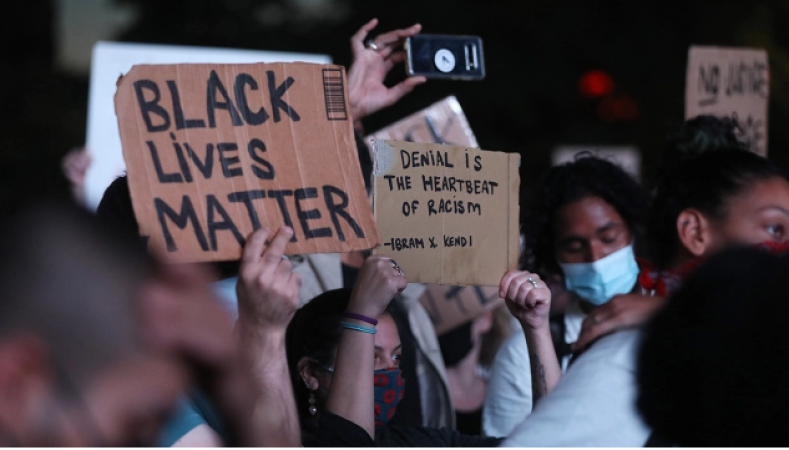
United States: Republican attempts to gain political support by inciting racial fear and hatred, cooperating with the police in conflict with African Americans, and condemning Black Lives Matter demonstrations are a clear feature of our political landscape. Although they are not new either. The battle lines for 2022 were in many ways being built as early as 1964. The fundamental problems, both then and now, can be explained by a paper that appeared 58 years ago in this week's edition of the New York Times.
On July 2, 1964, President Lyndon B. Johnson urged Americans to "stop the cascade of racial poison" as he signed the Civil Rights Act of 1964. Two weeks later, a 15-year-old African American was shot dead in Harlem by a New York City police officer, the same evening Sen. Barry Goldwater accepted the Republican presidential nomination, openly supporting the insurgency. The incident began when a group of black children, who often sat on the stairs of buildings, were toppled by the white superintendent of an apartment complex. According to him, the superintendent shouted at him, "Dirty n***ers, I'll wash you. Super retreated inside one of the buildings as a result of his reaction, which saw him throwing bottles and trash can lids at him." James Powell, a boy who was not involved in the original incident, followed him. When Powell left the building, a police officer who was not on duty shot and killed Powell.
Soon after, a scuffle broke out between the neighboring youths and the police. These conflicts intensified over the next few days and turned into the first significant urban "riot" or "rebellion" of the 1960s. (Those two nouns were used by different groups to refer to the same phenomenon; the former was mostly used by white people, the latter by black people, and as the decade progressed, whites on the left increasing ratio.)
By the evening of July 18, thousands of black people were in the streets of Harlem, looting stores and shouting "Killers! Killers!" in the police. People in the crowd shouted "We are home, baby" in response to a police officer's attempt to disperse one of the crowd by ordering them to "go home, go home".
Northern urban uprisings spread over the ensuing weeks to the Brooklyn neighborhood of Bedford-Stuyvesant (which was then predominantly black and low-income but now undergoing rapid gentrification), Rochester, New York; for Jersey City, Paterson and Elizabeth in New Jersey; And finally to Chicago. Following the Democratic convention in Atlantic City in late August, serious unrest broke out in Philadelphia less than 60 miles to the west. As in other cases, allegations of police brutality and strained or overly hostile relations between the police and the African-American community were the root cause. Of course, there was nothing new about white police officers hitting and beating black people in 1964. It was also not uncommon for such incidents to cause destruction of property and sometimes ignite violent rebellion in the black community.
But beginning in 1964 and continuing through the rest of the 1960s, street-level resistance from black residents increased significantly. As one historian Elizabeth Hinton demonstrates in her 2021 book "America on Fire: The Hidden History of Black Rebellion and Police Violence Due to the 1960s," "African Americans have often erupted in rebellion as a result of brutal policing which Still serves a major front in the conflict today. Even today, more than 50 years later, white police officers who killed black people are rarely found guilty. The Minneapolis police officer who killed George Floyd There is optimism for change on this front after he was convicted of murder in 2021, but police killings of black people during and after that trial continue.
Also familiar are Republican hopes for 1964 and Democrats' concerns about the political consequences of the racial conflict. The riots worried President Johnson that Goldwater might win the election in November. "If we're not careful, we're going to preside over a country that's so badly divided that they don't want to be in any such situation," White House press secretary George Reidy warned Johnson after the Harlem riots broke out a few days later. Will vote for the person we are not."
Johnson felt the need to condemn the riots as Democrats do today, stressing the importance of working toward racial equality and justice. “There can be no compromise in the protection of law and order – just as there can be no compromise in securing equal and accurate justice for all Americans,” he said in a July 20 statement regarding the situation in Harlem.
Johnson won the 1964 election with the largest margin of victory in American political history, allaying the threat that a "backlash" among white voters would turn the country against Johnson and in favour of Goldwater. Johnson had anticipated a dramatic political backlash in 1964; however, it was to be a much larger uprising in the Watts neighbourhood of Los Angeles in August 1965, which started five days after Johnson signed the Voting Rights Act into law.
A Black woman from Brooklyn named Barbara Benson, who wrote a letter to the editor of the New York Times following the outbreak, provided a brilliant explanation of the reasons behind the rioting in 1964. Specifically worried that "this rioting may have made a Goldwater victory more likely," Benson wrote that she wept "at the damage done to this city and the world by the Harlem riots." But she felt compelled to make an effort to explain what causes rioting. Over fifty years later, her words still ring all too true
There was really no need for the various commissions established between 1964 and the end of the decade, most notably the National Advisory Committee on Civil Disorders, also known as the "Kerner Commission," which Johnson established in 1967.
Biden to lays out USD 37 bln funding plan for crime prevention
Crude Oil rises after Biden fails to secure pack on increasing Saudi supply